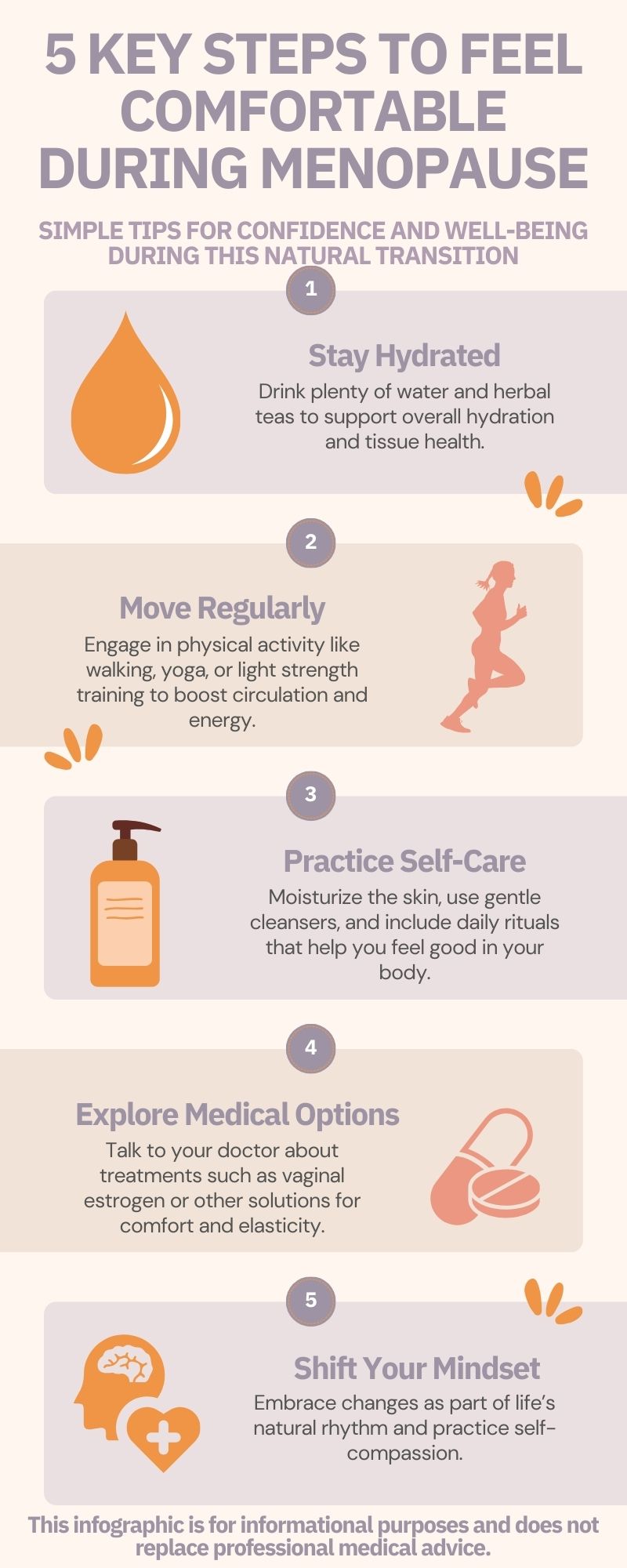Navigating Body and Intimate Changes During Menopause With Confidence

Menopause is a natural phase in life that brings significant physical changes, both visible and intimate. While the process is universal, the experience feels deeply personal—often accompanied by uncertainty about what’s “normal.” From skin texture and body composition to changes in genital appearance and sensation, these transitions can impact how you see yourself and your relationship with your body.
This guide focuses on understanding what happens, why it happens, and practical ways to maintain confidence and comfort throughout these changes.

1. Understanding the Physical Changes
The first step toward confidence is knowledge. Menopause marks the end of menstruation, but it also influences multiple systems in the body due to a decline in estrogen and other hormones. Some common changes include:
-
Skin and Muscle Tone: Reduced collagen can lead to thinner skin and decreased elasticity, sometimes making the skin appear more fragile.
-
Weight Distribution: It’s normal to notice fat shifting toward the abdomen rather than the hips or thighs.
-
Breast Tissue: Breasts may lose firmness as glandular tissue decreases.
-
Genital Changes: The vulva and vagina often undergo visible changes such as:
-
Thinning of the labia minora
-
Lightening or darkening of skin tone
-
Reduced elasticity in vaginal tissue
-
Less natural lubrication
-
These changes are not signs of poor health but a natural progression of aging biology.
| Change | Why It Happens | Care Tip |
|---|---|---|
| Dryness | Lower estrogen reduces moisture | Use lubricants and stay hydrated |
| Loss of Elasticity | Reduced collagen in tissue | Pelvic floor exercises, topical estrogen |
| Skin Thinning | Collagen and fat loss | Moisturize and use gentle cleansers |
2. Why These Changes Happen
Hormones, particularly estrogen, play a major role in maintaining skin elasticity, vaginal thickness, and moisture. As estrogen levels drop, the tissues lose some of their former characteristics. Understanding that these shifts are part of a normal cycle—not a reflection of attractiveness or worth—can help reduce self-criticism.
3. Practical Steps for Comfort and Confidence
Moisture and Hydration
-
Vaginal Moisturizers and Lubricants: Over-the-counter products can relieve dryness and make intimacy more comfortable. Opt for water- or silicone-based lubricants without harsh chemicals.
-
Hydration and Diet: Staying hydrated and consuming foods rich in omega-3 fatty acids can support skin and tissue health.
Gentle Care for Changing Skin
-
Use mild cleansers instead of harsh soaps to avoid irritation.
-
Apply unscented moisturizers to keep the vulvar area from feeling dry or itchy.
Support Elasticity
-
Pelvic Floor Exercises: Simple movements like Kegels can maintain muscle tone and improve blood flow to the genital area.
-
Movement and Strength Training: Regular physical activity helps maintain circulation and body tone, which can indirectly benefit genital health.
Medical Support Options
-
Vaginal Estrogen Therapy: Available as creams, tablets, or rings, these can restore some elasticity and moisture.
-
Laser or Radiofrequency Treatments: Non-surgical options exist for those concerned about comfort or function.
Always consult a healthcare professional before starting any new treatment.

4. Adjusting to Changes in Appearance
Many women feel unsettled when noticing changes in the vulva or labia. Remember:
-
Variation Is Normal: Genital appearance varies greatly between individuals, and changes over time are expected.
-
Focus on Comfort: Instead of comparing to the past or media images, prioritize how you feel physically.
-
Communication: If partnered, open conversations about these changes can reduce anxiety and improve intimacy.
5. Confidence Beyond Appearance
Confidence often comes from shifting perspective. Instead of viewing these changes as a loss, consider them an evolution—evidence of a life lived. Confidence is not about ignoring reality; it’s about accepting what is and making choices that support your well-being.
-
Dress in fabrics that feel comfortable and flattering.
-
Explore self-care rituals that help you feel connected to your body—massage, warm baths, or gentle yoga.
-
Remind yourself that aging is natural and not a sign of diminished worth or desirability.
Closing Thoughts
Body and genital changes during menopause are a normal part of life’s progression. By staying informed, addressing discomfort with practical solutions, and reframing your perspective, you can move through this chapter with confidence and self-assurance.
Disclaimer: The articles and information provided by the Vagina Institute are for informational and educational purposes only. This content is not intended to be a substitute for professional medical advice, diagnosis, or treatment. Always seek the advice of your physician or another qualified health provider with any questions you may have regarding a medical condition.


 Deutsch
Deutsch  English
English  Español
Español  Français
Français 




